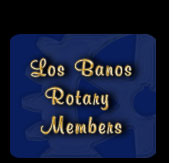




Los Banos Rotary Club History
Lloyd
Stearman Is Rotary Speaker
Lloyd Stearman, unquestionably
the most qualified aviation authority ever to address a Los Banos audience, was
guest speaker at the Rotary Club luncheon Tuesday noon. Confining his remarks
mainly to aviation in general, Stearman pointed out that the airplane, which as
late as 1920 was believed to be only a dangerous plaything, has developed so phenominally
that at the close of World War II it ranked as the biggest industry in the world.
At the height of war construction, the speaker said, Douglas Aircraft Co., America’s
largest manufacturer of airplanes, was bigger than Ford ever was.
Peacetime
usefulness of the airplane, Stearman believes, will be equally as important as
in the war. As an example, he pointed out that already there are some thirty airline
schedules daily from the west coast to New York, and present international schedules
make any portion of the world only a day or two away. As to the feasibility of
international travel by air Stearman pointed out that during the war, the Army
Air Transport Command operated a schedule across the Atlantic at the rate of one
plane every seven minutes.
Commenting on some of tomorrow’s airliners,
Stearman called attention to the Boeing transport, with its four 2,000 h.p. engines,
that carries 100 passengers and crew at a speed of over 300 miles an hour; and
the even larger Consolidated plane, with six engines, that carries 207 passengers
at the same speed. All big airliners, he said, will have pressurized, soundproof
cabins and will operate at altitudes of 20,000 feet.
As to safety of
air travel, Stearman pointed out that last year some 40,000 people were killed
in highway accidents in this country alone. In contrast, United Airlines has a
record of one billion passenger miles without a single fatality! All airplanes
are regularly inspected for airworthiness; all pilots are licensed and must periodically
pass rigid examinations.
Commenting briefly on the activities of his
own organization here, Stearman said its primary business will be in agricultural
aviation, both from manufacturing and service standpoint. They are building a
fleet of specially designed planes for agricultural seeding, dusting and fertilizing,
which they will operate throughout central California. In addition, they have
orders for many similar planes for use in other areas. The company plans the immediate
construction of a large hanger and workshop, where planes may be manufactured
in quantity.
In the manufacture of this plane, the company uses an army
primary trainer originally designed by Stearman. The front cockpit and controls
are removed and a 1000-pound hopper is installed. The 220 h.p. engine used on
the army trainer is discarded and in its place is used a 450 h.p. Pratt &
Whitney engine from an army BT basic trainer. Stearman said that both Pratt &
Whitney and Boeing were cooperating with the local company in the development
of this new special purpose plane.
Stearman said he was well satisfied
with the location of his company in Los Banos.
January 15, 1946
© Copyright 2009 by
Los Banos Enterprise, Rotary Club 585 & Memorable Places Web Design of Los Banos


